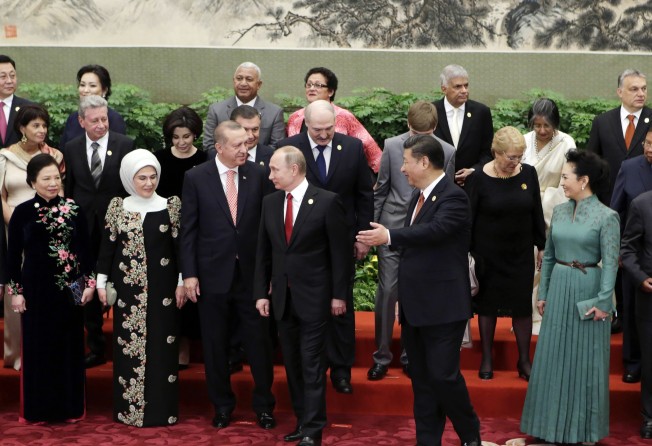Xi Jinping primes China to be leader of the free-trade pack
Chinese president casts himself as a defender of an open global order and China as a source of stability but gives few signs of how to settle differences, analysts say

China looks poised to take on a leadership role in the global economy, with President Xi Jinping making a vigorous defence of free trade and globalisation in Beijing on Sunday.
The new Silk Road extravaganza promoting Xi’s ambitious global trade and infrastructure programme, promoted by state media as China’s coming-of-age on the world stage, offered Xi a chance to outline his vision of his country’s role in a changing world order.
Observers said it was the second time since the World Economic Forum in Davos in January that Xi had cast himself as a defender of global economic openness and free trade.
As the world grapples with political uncertainties in Europe and the United States, Xi appeared more steadfast and confident on Sunday, fortified by a tighter grip on power at home ahead of a major personnel reshuffle later this year.
In his opening address to the Belt and Road Forum for International Cooperation, Xi sought to position himself as a champion for a benevolent new world order based on “a new model of win-win and cooperation”, rather than on gunboat diplomacy or a zero-sum mindset.
“We will not follow the old way of geopolitical games during the push for the Belt and Road Initiative,” he said.
“China is willing to share its development experience with the rest of the world, but we will not intervene in other nations’ internal affairs, export our social system and development model, nor force others to accept them.”
Alexander Gabuev, from the Carnegie Moscow Centre, said Xi’s speech was carefully crafted to deliver messages to both domestic and foreign audiences. For countries raking part in the initiative, especially emerging economies or countries in need of investment, “Xi has tried to bring a positive message on economic opportunities provided by China coming without political strings attached”, he said.
Steve Tsang, director of the SOAS China Institute in London, said Xi likened the initiative’s member countries to an extended family in Chinese tradition, but did not specify who should take the lead in the group.
“Is it not obvious? Countries neighbouring China that are involved may well feel they are requested and required to join. Countries further afield no doubt see this as a gravy train and don’t want to miss out,” Tsang said.
While leaders from 29 out of 64 countries covered by the initiative gathered in Beijing, most developed nations, including the US, remain suspicious of China’s efforts, sending delegations led by lower-level officials or representatives instead. India skipped the two-day gathering over concerns about warming ties between China and Pakistan.
Acutely aware of mounting concerns over rising protectionism, Xi touted China’s contributions to global economic stability.
Xi also spent much of his speech trying to allay unease about China’s rising diplomatic, economic and military assertiveness, describing his signature foreign policy push as “inclusive”.
Analysts said Xi’s message on greater openness and adherence to the principles of free trade dovetailed with his Davos speech.
They said domestic political considerations also loomed large at the forum, which comes in the lead-up to the Communist Party’s national congress in the autumn.
“For domestic audiences, it was important for Xi to project his image as a confident and visionary leader being able to roll out an ambitious strategy that would appeal to the outside world,” Gabuev said.
Tsang also said Xi appeared to have articulated an obvious desire to play a more proactive leadership role, but on Chinese terms.
“He avoids giving any indication as to how countries should resolve their differences if their core interests conflict with each other,” he said.
Tsang said Xi fell short of spelling out his ambitions to rewrite the global rules of the game but Beijing was unlikely to allow China’s core interests to go unmet should they conflict with other countries, such as those from Central or Southeast Asia.
Gabuev said: “It is very important to remember that the initiative doesn’t have any criteria for success.”
Additional reporting by Jane Cai